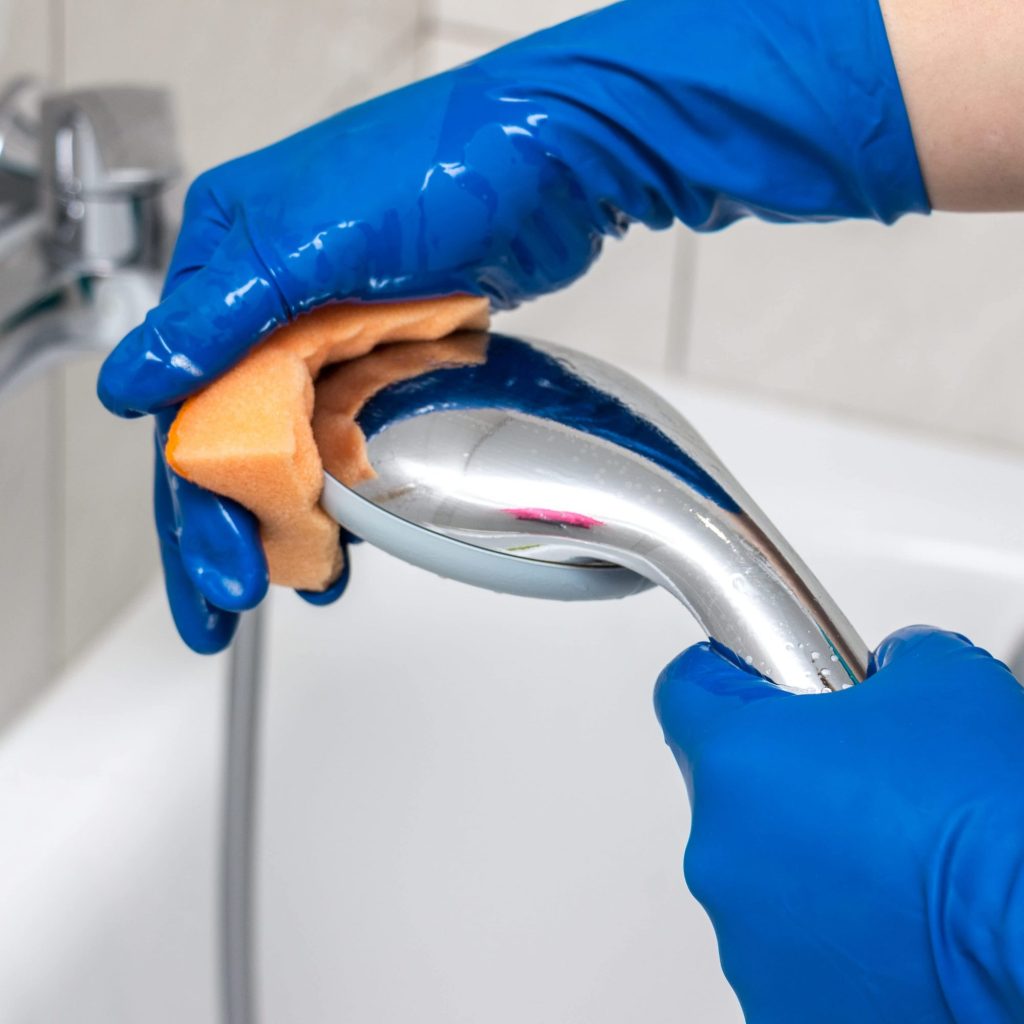There are some areas of the home that you just don’t really think about cleaning often, and your showerhead in your bathroom might just be one of them. But in reality, this seemingly unimportant part of your shower needs to be cleaned just as often as the rest of the bathroom. Thanks to the warm dampness of a bathroom, your showerhead is actually a prime spot for mould growth, so it’s important to stay on top of your cleaning routine.
Like most household objects, if you leave your showerhead unkempt for long periods, the cleaning process may take a little longer. Fortunately, tidying your showerhead is incredibly easy to do, no matter how long you’ve waited in between cleaning sessions. We spoke to some experts to get some tips for cleaning your showerhead, and why it’s important to do so.
Why You Should Clean Your Showerhead
Cleaning your showerhead should be routine in your home. Without proper upkeep, not only does your showerhead eventually start to clog, but you might even see some mould growth over time. The clog comes from mineral deposits that are naturally found in your water. If you have hard water, there’s a good chance a clog will happen even faster than in a home with soft water. As your showerhead starts to clog, you’ll notice less water pressure and an uneven stream, ruining your showering experience.
Mould growth on your showerhead can be equally as annoying. Mould can happen pretty much anywhere, but it won’t grow unless it’s moist, according to the EPA. The most common reaction to mould is an allergic one, though some moulds can become toxic. Your entire shower is actually a risk for mould growth, which is why you should clean everything regularly, including your showerhead.
Is the Mould on a Showerhead Dangerous?
Though you may be inclined to think that a dirty showerhead could affect your skin, especially if there’s mould present, it’s highly unlikely that that will happen. “I did a literature search and only found possible skin infection with Pseudomonas aeruginosa, which has been found in showerhead biofilms,” says dermatologist and “Beyond Soap” author Sandy Skotnicki, MD, FRCPC. “These bacteria can cause ear and eye infections, but it is extremely rare.”
Dr Skotnicki also notes that in extreme cases where showerheads have a lot of mould or grime, people should be more concerned about it affecting their lungs rather than their skin. “In patients with existing lung disease or those extremely immunocompromised, this type of chronic lung infection is possible from dirty showerheads,” Dr Skotnicki says.
How to Clean a Showerhead With Vinegar
Using vinegar to clean your showerhead is one of the easiest and cheapest ways to do it. “The most effective way to remove soap scum, calcium buildup, and general grime from a showerhead is to use a ziplock bag,” says Adriana Aziz of Australia-based cleaning service Maid For You. “In a ziplock bag, mix a solution of vinegar, baking soda, and dishwashing liquid. Use a rubber band to secure the bag around the showerhead for 15 to 20 minutes. Once the time has elapsed, remove the ziplock bag from the showerhead and scrub using a soft brush.”
Aziz notes, though, that this method is best for chrome showerheads. If your bathroom has a showerhead made of something else, like plastic, check the manufacturer’s instructions first before using this cleaning method, as other materials might not react well to this mixture.
How to Clean a Showerhead With Lime-A-Way
Lime-A-Way is specifically designed to get rid of hard water buildup and stains. If your home has hard water, this may be a better option for cleaning your whole shower, including your showerhead. “If DIY cleaning doesn’t excite you, you can use a calcium cleaning product like Lime-A-Way, which removes limescale, calcium, and rust, and you won’t need to go through all the effort of creating a homemade cleaning solution in a ziplock bag,” Aziz says.
It’s recommended to follow the instructions on the Lime-A-Way bottle when cleaning your showerhead. Typically, though, you’d apply the solution on your showerhead and allow it to sit for a minute before rinsing it off. As with any cleaning method, this should be done frequently to prevent buildup or mould. Once per month is ideal.
Should You Use Bleach to Clean a Showerhead?
In some instances, bleach can be used to get rid of mould. The CDC recommends using no more than one cup of bleach per one gallon of water. However, it’s important to take extreme caution when using bleach. You definitely shouldn’t mix bleach with ammonia, as this creates a toxic fume. Additionally, be sure to have a window open and use gloves to prevent any breathing and skin irritation. When you’re done cleaning, make sure the bleach is completely removed from the showerhead before the next time you use it, as any remains can irritate your skin and eyes while you take a shower.

